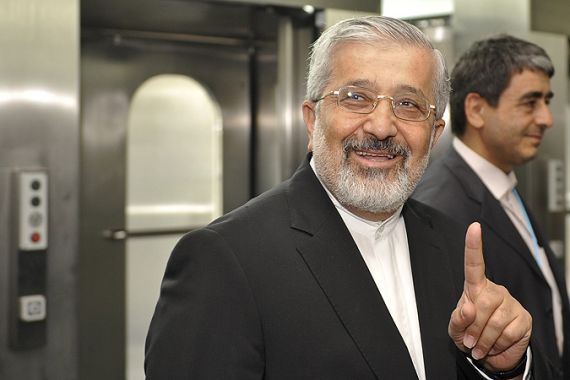Iran agrees on ‘some points’ with IAEA
Iran chief negotiator says “new proposals” put forward at talks but they will be discussed at “future meetings”.

Iran has agreed on “some points” in talks with experts from the UN atomic watchdog in Tehran, its lead negotiator
at the meeting said, quoted by local media.
“Some differences were resolved and agreement on some issues in the modality was reached,” Ali Asghar Soltanieh, Iran’s envoy to the International Atomic Energy Agency (IAEA), was quoted as saying by ISNA news agency on Wednesday.
“New proposals,” Soltanieh said, had been put forward at the talks but they would be discussed at “future meetings”, indicating that they had again failed to finalise a long-sought deal.
The IAEA had hoped to bridge persistent differences with Iran preventing the Vienna-based UN agency from restarting a stalled investigation into suspected nuclear weapons research by Tehran.
Iran has consistently rejected the charges, denying the IAEA broader access to sites, scientists and documents involved in these alleged military activities.
There was no immediate comment from the IAEA after the talks, the third of its kind in the past three months.
‘Flexible negotiations’
Meanwhile, Catherine Ashton, the European Union’s top diplomat, has said Iran should show flexibility in upcoming negotiations to resolve the dispute over its nuclear activities.
Ashton told a UN Security Council session at UN headquarters in New York that Iran’s nuclear issues remain at the top of the European Union agenda.
Iran and the so-called E3+3 group or P5+1 – Britain, China, France, Russia, the United States and Germany – are due to resume discussions in Almaty, Kazakhstan’s capital, on February 26, after a months-long break and failed meetings in Istanbul, Baghdad and Moscow.
“We hope Iran will come to this negotiation with flexibility and that we can make substantial progress,” said Ashton, who is the High Representative of the European Union for Foreign Affairs and Security Policy.
“Our strength and credibility in negotiating with Iran derives from the E3+3, but also from the more general support that we receive from the international community,” she said.
The Iranian mission to the UN in New York issued a statement following Ashton’s address to the council, saying that Iran is “fully committed” to the Nuclear Non-proliferation Treaty and to cooperate with the IAEA.
The statement said Iran’s legitimate rights to have a fuel cycle, including enrichment of uranium, should be fully recognised by the E3+3 group.
It said Iran is “serious about those talks and expects the other side to be serious and forthcoming so that the next round of negotiations … would lead to positive and fruitful results”.